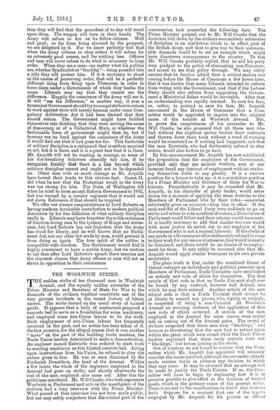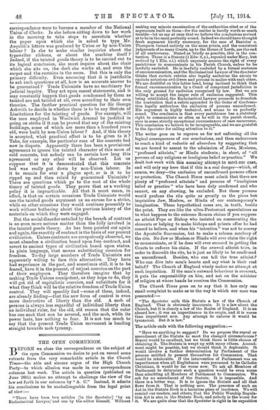THE WOOLWICH STRIKE. T HE sudden strike of ten thousand men
in Woolwich Arsenal, and the equally sudden surrender of the Prime Minister and Secretary of State for War to the demands of the strikers, together constitute one of the very gravest incidents in the recent history of labour unrest. The strike turned on the usual story of tainted goods. It appears that a body of contractors prepared a concrete bed to serve as a foundation for some machinery, and employed some non-Union labour to do the work. Such employment of non-Union labour has frequently occurred in the past, and no notice has been taken of it. On this occasion, for the alleged reason that it was another " move" on the part of the building trade masters, the Trade Union leaders determined to make a demonstration. An engineer named Entwistle was ordered to start work in erecting machinery on this tainted concrete bed. Acting upon instructions from his Union, he refused to obey the orders given to him. He was at once dismissed by Sir Frederick Donaldson, the head of the Arsenal. Within a few hours the whole of the engineers employed in the Arsenal had gone on strike, and shortly afterwards the rest of the men employed also came out. After this the politicians interfered. Mr. Will Crooks, who both represents Woolwich in Parliament and acts as the mouthpiece of the strikers, had a long interview with the Prime Minister. What passed at that interview has not been made public, but one may safely conjecture that the critical part of the conversation took somewhat the following turn. The Prime Minister pointed out to Mr. Will Crooks that the doctrines laid down by the strikers were entirely subversive of discipline in an institution which is, in effect, part of the British Army, and that to give way to their unreason- able demands would be to set an example which might have disastrous consequences to the country. To this Mr. Will Crooks probably replied that he and his party were pledged to the policy of eliminating non-Unionists, and meant to see that policy through. We may safely assume that he further added that a critical motion was coming before the House of Commons a few hours later, that it known that many Liberals intended to refrain from voting with the Government, and that if the Labour Party should also refrain from supporting the Govern- ment a Ministerial defeat would be inevitable. After that an understanding was rapidly reached. To save his face, or, rather, to pretend to save his face, Mr. Asquith announced in the House of Commons that a Com- mittee would be appointed to inquire into the original cause of the trouble at Woolwich Arsenal. But, to prove the completeness of his surrender to Mr. Will Crooks, he also promised that all those men who had without the slightest excuse broken their contracts and thrown down their tools without a word of warning would be reinstated as if nothing had happened, and that the man Entwistle, who had deliberately refused to obey orders, would also be free to go back.
By this announcement Mr. Asquith has now established the proposition that the employees of the Government, provided only they are manual workers, may at any moment break any contract of employment without render- ing themselves liable to any penalty. It is a curious position for a lawyer to take up ; it is a scandalous position for a Prime Minister and Secretary of State for War to tolerate. Parenthetically it may be remarked that Mr. Asquith, in his character of party leader, would never dream for a moment of applying the same doctrine to the Members of Parliament who by their votes—somewhat reluctantly given on occasion—keep him in office. If the rank-and-file of the Liberal Party were suddenly to go on strike and refuse to vote in critical divisions, a Dissolution of Parliament would follow and their salaries would terminate. It is hardly necessary to add that similar measure would with more justice be meted out to any employee of the Government who is not a manual labourer. If the clerks of any grade in a Government office deliberately refused to come to their work for any reason whatsoever, they would instant] y be dismissed, and there would be no chance of re-employ- ment for them. It may safely be assumed also that Mr. Asquith would apply similar treatment to his own private secretaries.
The plain truth is that, under the combined threat of violent outrages on individuals and political pressure upon Members of Parliament, Trade Unionists have established an entirely new code of ethics for themselves. The first article of that code is that no Trade Unionist shall ever be bound by any contract, however well defined, into which he may have entered. Another article of the new ethical code is that a Trade Unionist shall always be at liberty to assault any person who, rightly or wrongly, is suspected of being a non-Unionist. At Woolwich Arsenal an amusing instance of the application of this new code of ethics occurred. A section of the men employed in the Arsenal for some reason were rather late in coming out of the Arsenal gates. The crowd of strikers suspected that these men were " blacklegs," and became so threatening that the men had to retreat again within the gates, which were closed while the Trade Union leaders explained that these tardy arrivals were not " blacklegs, but heroes joining in the strike. Out of courtesy we are bound to assume that the Com- mittee which Mr. Asquith has appointed will seriously consider the issues involved, although the surrender already made renders futile in advance any decision to which they may come. It may be assumed that an attempt will be made to justify the Trade Unions. If so, the Com- mittee will have to begin by explaining how it is in practice possible to give effect to the doctrine of tainted goods, which is the primary cause of the present strike. There is no end to the ramifications to which this doctrine leads. Suppose for a moment that one of the typists employed by Mr. Asquith for his private or official correspondence were to become a member of the National Union of Clerks. Is she before sitting down to her work in the morning to take steps to ascertain whether the paper upon which she is asked to type Mr. Asquith's letters was produced by Union or by non-Union labour ? Is she to make similar inquiries about the typewriter ribbons, or about the machine itself ? Indeed, if the tainted goods theory is to be carried out to its logical conclusion, she must inquire about the chair which she sits on, the desk she works at, and even the carpet and the curtains in the room. But this is only the primary difficulty. Even assuming that it is justifiable to ask such questions at all, how is an accurate answer to be guaranteed ? Trade Unionists have no machinery for judicial inquiry. They act upon casual statements, and it may constantly happen that goods condemned by them as tainted are not tainted at all, even according to their own theories. The further practical question for Sir George Askwith to decide is whether there is to be any Statute of Limitations for the tainting of goods. For example, will the men employed in Woolwich Arsenal be justified in going on strike if it can be proved that any of the existing buildings, some of which are more than a hundred years old, were built by non-Union labour ? And, if this theory is accepted, what practical effect is to be given to it ? Take, for example, the particular case of the concrete bed now in dispute. Apparently there has been a provisional agreement to ignore the tainted character of this mass of cold concrete, but nobody can be certain how long this agreement or any other will be observed. Let us suppose that it is demonstrated that this concrete bed was really put down by non-Union labour. Is it to remain for ever a plague spot, or is it to be ripped up and then relaid by guaranteed Unionists ? These are questions which go to the root of the whole theory of tainted goods. They prove that as a working policy it is impracticable. All that it must mean, in effect, is that on certain occasions Trade Unionists would use the tainted goods argument as an excuse for a strike, while on other occasions they would continue peaceably to work without bothering about the previous history of the materials on which they welt engaged.
But the social disorder entailed by the breach of contract is an even more serious matter than the folly involved in the tainted goods theory. As has been pointed out again and again, the sanctity of contract is the basis of our present civilization. Unless contracts are scrupulously observed, we must abandon a civilization based upon free contract, and revert to ancient types of civilization based upon status. In plain language, that means substituting coercion for freedom. To-day large numbers of Trade Unionists are apparently willing to face this alternative. They have had experience in the past, and sometimes still, it is to be feared, have it in the present, of unjust coercion on the part of their employers. They therefore imagine that by making Trade Unions omnipotent, as they hope to do, they will get rid of capitalistic coercion, and substitute for it what they think will be the relative freedom of Trade Union control. They will speedily find—some of them, indeed, are already finding—that the new form of control is even more destructive of liberty than the old. A mob of persons is always less regardful of individual liberty than an individual ruler, for the old, old reason that the ruler has one neck that can be severed, and the mob, while its power lasts, has nothing to fear. It is not too much to say that the present Trade Union movement is heading straight towards mob tyranny.







































 Previous page
Previous page